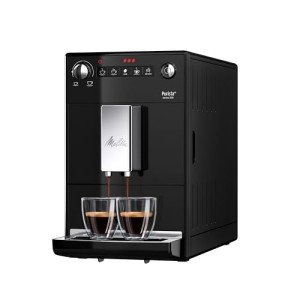Home Use Espresso Machines: A Comprehensive Guide
Espresso machines have actually become a staple in numerous households as coffee enthusiasts seek to reproduce café-quality brews in the comfort of their cooking areas. The increase in popularity has actually caused a varied market filled with numerous designs, features, and prices. This short article aims to provide a helpful overview of home use espresso machines, assisting readers navigate their options effectively.
Comprehending Espresso Machines
Espresso machines work by forcing warm water through finely-ground coffee under high pressure, resulting in a concentrated coffee drink called espresso. There are numerous types of espresso machines categorized based upon their developing approaches and level of automation. The most typical types include:
- Manual Espresso Machines: These need the user to control the pressure and water flow, allowing for a more hands-on coffee-making experience.
- Semi-Automatic Espresso Machines: These use automatic control over water pressure, while the user by hand grinds and tamps the coffee.
- Automatic Espresso Machines: With the push of a button, these machines immediately control the circulation of water, making it much easier to brew espresso with constant outcomes.
- Super-Automatic Espresso Machines: These all-in-one machines manage grinding, tampering, brewing, and even milk frothing, making them ideal for users trying to find convenience.
- Pill or Pod Machines: These use pre-packaged coffee pods to develop espresso with minimal effort, but they limit choice in brewing methods and tastes.
Table: Comparison of Espresso Machine Types
| Type | Control Level | Relieve of Use | Cleaning Level | Perfect For |
|---|---|---|---|---|
| Manual | User-controlled | Moderate | High | Coffee purists |
| Semi-Automatic | Partial automation | Moderate | Moderate | Home baristas |
| Automatic | Fully automated | Easy | Low | Hectic people |
| Super-Automatic | Completely automated | Very easy | Very low | Convenience seekers |
| Capsule/Pod | Totally automated | Really easy | Extremely low | Casual drinkers |
Key Features to Consider
When choosing a home use espresso machine, it's important to consider different functions that can substantially impact the quality of espresso and user experience.
- Pressure: Look for machines that offer a minimum of 9 bars of pressure, as this is thought about optimal for brewing espresso.
- Boiler Systems: Single vs. dual boiler systems figure out temperature level stability and the capability to brew espresso and steam milk concurrently.
- Grinder: Integrated mills enable for freshly ground coffee, which enhances taste. Think about machines with adjustable grind settings.
- Milk Frother: For those who delight in cappuccinos and lattes, a built-in steam wand or automatic frother is important.
- Size and Design: Consider your kitchen area area and visual choices. Machines can be found in various sizes, from compact to large setups.
- Price: Home espresso machines can vary from a few hundred to numerous thousand dollars, so it's essential to develop a budget before checking out options.
Advantages and disadvantages of Home Use Espresso Machines
| Pros | Cons |
|---|---|
| Benefit of brewing coffee in your home | Preliminary investment can be high |
| Quality of espresso is frequently superior | Needs some ability, especially with manual machines |
| Ability to explore tastes | Upkeep and cleansing can be labor-intensive |
| Can conserve cash in the long run | Not all machines will fit every coffee preference |
Maintenance and Cleaning Tips
Keeping an espresso machine is vital for extending its life and guaranteeing consistent brew quality. Here are some useful ideas:
- Regular Descaling: Minerals from water can develop in the machine. Descale every 1-3 months, depending upon water hardness.
- Daily Cleaning: Rinse portafilters, baskets, and steam wands after each use to prevent coffee oils from constructing residue.
- Use Filtered Water: This can assist minimize mineral buildup and improve the taste of coffee.
- Replace Gaskets and Seals: These elements may break with time and must be changed to keep pressure and performance.
- Read the Manual: Each machine has particular care instructions; following these will guarantee longevity.
Frequently Asked Questions About Home Use Espresso Machines
Q1: What is the very best budget espresso machine? Pump Espresso Machines depends on private requirements, but designs like the DeLonghi EC155 or the Breville Bambino are popular amongst users for supplying fantastic worth. Q2: How long do home espresso machines normally last?With proper maintenance, home espresso machines can last anywhere from 5 to 15 years, depending on the quality of the machine and frequency of use. Q3: Can I make cappuccinos and lattes with any espresso machine?While most espresso machines can make cappuccinos and lattes, having a trustworthy
steam wand or frother is vital for achieving the ideal milk texture.
Q4: Are super-automatic machines worth the investment?For those who prioritize convenience and quick brewing, super-automatic machines can be worth the financial investment, though they may do not have some customizability in brew strength and flavor. Q5: What kinds of coffee beans are best for espresso?While personal choice plays a function, beans labeled as" espresso "blends are normally roasted darker, developing rich tastes and a creamy texture when brewed.
Buying a home espresso machine can change the daily coffee regimen into something unique, elevating home brews to café quality. By understanding the different types of machines, essential functions to think about, maintenance needs, and weighing the
benefits and drawbacks, customers can make informed decisions that suit their private choices. As the espresso culture continues to grow, no matter the choice, every brew can be a delicious experience waiting to be appreciated.

